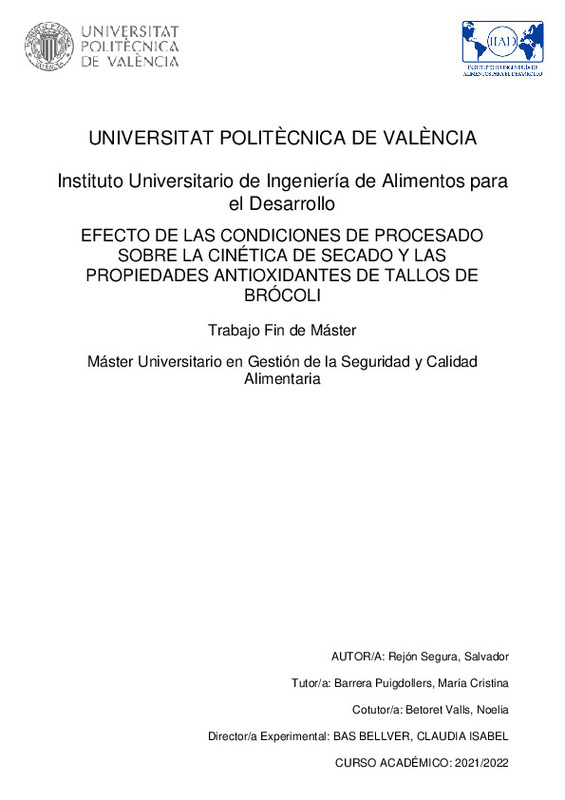|
Resumen:
|
[ES] El desperdicio alimentario derivado de la industria hortofrutícola constituye un grave problema ambiental, económico y social. En el caso concreto del brócoli, gran parte de su peso lo constituye el tallo, que suele ...[+]
[ES] El desperdicio alimentario derivado de la industria hortofrutícola constituye un grave problema ambiental, económico y social. En el caso concreto del brócoli, gran parte de su peso lo constituye el tallo, que suele ser desechado a pesar de su elevado contenido en una gran variedad de compuestos bioactivos. Una alternativa para la revalorización de este residuo consiste en transformarlo en una harina, cuyas propiedades funcionales dependerán de la técnica de deshidratación empleada y de los tratamientos previos aplicados. Es por esto que el presente trabajo se plantea con el objetivo de evaluar el efecto de la intensidad del triturado (triturado o troceado) y de la fermentación con Lactobacillus plantarum spp. CECT 749 previa a la deshidratación mediante liofilización o secado con aire a 60 y 70 ºC sobre las propiedades fisicoquímicas (incluidas las propiedades antioxidantes) de polvos procedentes de tallo de brócoli. Los resultados obtenidos ponen de manifiesto que la diferente intensidad de la desestructuración previa tiene un impacto similar sobre la velocidad de secado y las propiedades antioxidantes del polvo de tallo de brócoli. El secado con aire a 70 ºC acortó el proceso de secado sin afectar negativamente al contenido en compuestos antioxidantes, llegando incluso a incrementar su actividad. La fermentación previa al secado incrementó notablemente la velocidad de secado, incrementando el contenido en fenoles y flavonoides totales. Sin embargo, la liofilización permitió obtener un polvo con mejores propiedades antioxidantes y mayor contenido microbiano, pudiéndose afirmar que se trata de polvos de tallo de brócoli con potencial efecto probiótico.
[-]
[EN] Food waste derived from the fruit and vegetable industry is a serious environmental, economic, and social problem. In the specific case of broccoli, much of its weight is made up of the stem, which is usually discarded ...[+]
[EN] Food waste derived from the fruit and vegetable industry is a serious environmental, economic, and social problem. In the specific case of broccoli, much of its weight is made up of the stem, which is usually discarded despite its high content of a wide variety of bioactive compounds. An alternative for the revaluation of this residue consists of transforming it into flour, whose functional properties will depend on the dehydration technique used and the previous treatments applied. Therefore, the present work is proposed with the objective of evaluating the effect of the intensity of grinding (crushed or chopped) and fermentation with Lactobacillus plantarum spp. CECT 749 prior to dehydration by lyophilization or air drying at 60 and 70 ºC on the physicochemical properties (including antioxidant properties) of powders from broccoli stem. The results obtained show that the different intensity of the previous destructuring has a similar impact on the drying speed and the antioxidant properties of the broccoli stem powder. Air drying at 70 ºC shortened the drying process without negatively affecting the content of antioxidant compounds, even increasing their activity. The fermentation prior to drying notably increased the drying rate, increasing the content of total phenols and flavonoids. However, lyophilization allowed to obtain a powder with better antioxidant properties and higher microbial content, being able to affirm that it is broccoli stem powder with potential probiotic effect.
[-]
|







